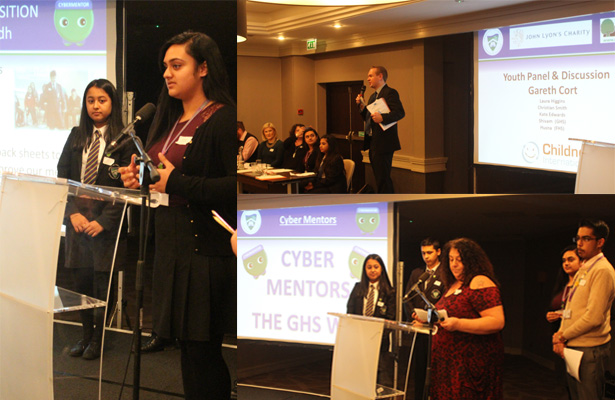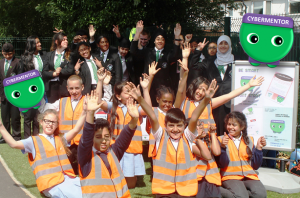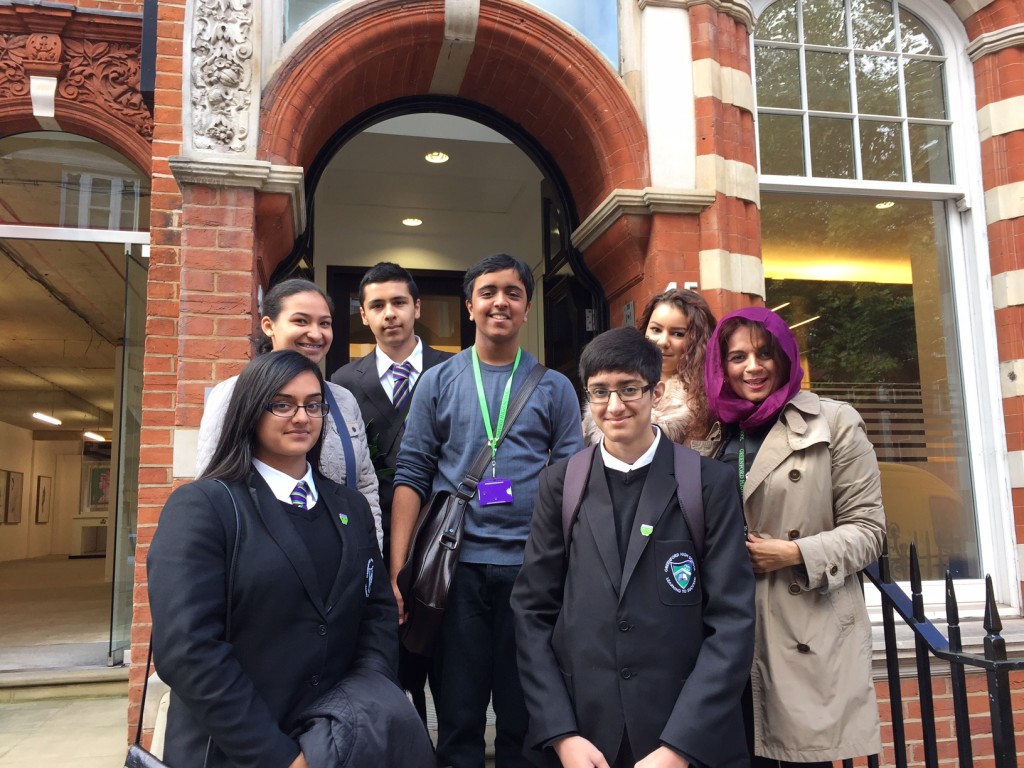
Category Archives: Greenford High School E-Safety
Three years on and how time flies!
As our E-Safety for Schools project reaches its final stage, I’m delighted to share some of the highlights and the legacy made possible by John Lyon’s Charity.
Over the course of our work, what became clear to us was the need to address online safety through a whole school and holistic approach. When we launched the project in 2014, our aim was to share best practice across three Ealing high schools through an extensive training and development programme, based on our tried and tested model at Greenford High School. Following initial consultations with each school, we began by delivering specialist Child Exploitation and Online Protection (CEOP) training to designated cohorts of staff – enabling them to set up their online safety/safeguarding committees to build effective practice and address online risk across the school community.
A key element of the project was our School CyberMentor Programme, to create a student taskforce of e-safety ambassadors and peer-mentors to support young people around cyberbullying. As the project evolved, we extended the programme to nine primary schools attached to our partner high schools, with the aim of developing e-safety provision through their transition links. I’m delighted to say that we exceeded our target and trained up 13 schools in total across Ealing, including 523 student CyberMentors to support their peers and work alongside staff and parents.
Our work was commended nationally, when last year we were awarded the 360 Safe Mark by South West Grid for Learning. I believe our success was ultimately down to a multi-agency approach whereby we were able to collaborate and benefit from the expertise from the local authority, CEOP, the UK Safer Internet Centre, Childnet International, and of course our school partnerships.
And it is through these partnerships that the legacy lives on. As well as launching the Ealing e-Safety Toolkit in collaboration with the Health improvement and School Effectiveness Team to support schools, we recently trained up 12 Safer Schools Police Officers around cyberbullying and sexting, to provide further support to schools and deliver assemblies. To ensure sustainability and extend our reach, we also held an E-Safety Leadership Day to equip the remaining High Schools who were not involved in the project – this included a Train the Trainer Day, providing them with the knowledge and skills to manage their own school CyberMentor programme in house.
Over the last 3 years, it has become evident that in addition to the threat of cyberbullying and online child exploitation, the unregulated nature of the Internet has extended the arena of grooming to include the added risk of radicalisation. So in response to our network of schools from our John Lyon’s School Partnership, we developed a steering group – ARISE (Anti Radicalisation In Schools for Ealing) – to support staff, pupils and parents to address radicalisation in schools, build resilience and promote critical thinking, both on and offline. A key component from this was the development of the Ealing Prevent Toolkit for Schools, providing guidance around strategic planning, policy and practice, promoting British values and online safety as part of a whole school approach to safeguard young people from radicalisation. The toolkit has received positive feedback from both Ofsted and the Department for Education (DfE) who have hosted it on their Educate against Hate website to reach schools nationally.
It has been an absolute privilege working with John Lyon’s Charity, and thanks to their support and funding, we were able to share the latest guidance from leading keynote speakers, showcase effective practice from our partner schools and provide the toolkit to 150 delegates from schools at our ‘Ealing Online Safety in Education Conference’ in November 2016. Having pioneered the project from its inception, it was incredibly rewarding to see such a positive outcome on schools’ understanding of, and response to online safety in Ealing, thanks to the Charity’s commitment to innovation and the positive impact on the lives of local children. I will continue to work in collaboration with Greenford High and Ealing Council to expand the legacy through our school partnerships and training programmes – stay posted for developments!
Launch of the new School CyberMentor Programme
Following our first ever Ealing E-Safety Conference for schools last year, we were approached by several local schools interested in developing their own e-safety programme to equip students and their families with the knowledge and skills to stay safe online. We used the expertise of our current team of student CyberMentors to create and pilot our new School CyberMentor Programme. This was achieved through consultancy and support from the Ealing Health Improvement Team, the local authority and from practitioners across social work, counselling, therapy, mentoring, victim support and youth work.
What is the School CyberMentor Programme?
The programme is an interactive training package for young people aimed at developing key skills to become e-safety ambassadors and peer-mentors in their own schools. Within this role they are equipped to support peers with issues around bullying, cyberbullying and emotional wellbeing as part of a whole school approach to e-safety. The training programme uses role play and other techniques to introduce the students to typical scenarios they might face and equip them with critical thinking skills for mentoring. During the training key staff identified to lead in e-safety, which is crucial to developing and embedding the programme across school. The programme also includes access to a personalised Toolkit with useful promotion material, presentations and refresher training tips for circle time, parent sessions and assemblies, to be delivered by trained mentors and staff. After completing the training the graduates are awarded certificates and receive CyberMentor badges for their blazers so they can be identified by their peers.
To ensure sustainability, partner schools demonstrate their commitment to e-safety by:
- Nominating a team of staff (represented by Inclusion, pastoral, child protection, SLT, ICT and learning support) to be part of an E-Safety/Safeguarding Committee. All staff attend a specialist Child Exploitation Online Protection (CEOP) training session.
- Selecting up to 30 suitable students to be trained as school CyberMentors.
- Completing a partnership agreement with Greenford High School and a 3 month post professional evaluation outlining developments linked into their action plan.
Our School CyberMentor Programme is now at a point where it has been developed, piloted, evaluated and tweaked in Greenford High school and across schools participating in the project. To support our transition partnerships, we also ran a Primary E-Safety Leadership Day in November 2015 for seven partner primary schools, where staff designated to lead in e-safety were invited to attend a CEOP session. It was an opportunity for them to find out more about selecting appropriate pupils, incorporating the School CyberMentor programme into their schools and the impact peer-mentors have made from participating schools. We would like to thank Stanhope Primary for showcasing their successful model of junior CyberMentors!
Stay posted for developments in the upcoming months!
CyberMentors present to John Lyon’s Charity!
I was thrilled when in September, we received an invitation from John Lyon’s Charity to meet the trustees at their Grants Committee meeting and talk about our e-Safety project. Rather than presenting solo, I thought this would be a wonderful opportunity for our student CyberMentors – the real stars and driving force behind our e-safety initiative – to share in their own words their journey and experiences, and the impact that the project had made.
As the day drew closer, six of our students met regularly at lunchtime and during breaks to develop and rehearse their presentation, whilst applying the skills they had acquired as part of their CyberMentoring training; communication, working as a team, assigning roles and responsibilities, motivation, time-management, active listening, organisation, and contingency planning to name a few. What I realised as I watched with great pride, was that in addition to graduating as e-safety ambassadors and peer-mentors – equipped with the knowledge and skills to support peers around online safety and bullying – that as individuals, they had grown considerably in confidence and maturity, having developed both valuable and transferrable life skills which they were now putting into practice.
The 14th October arrived, and as we walked to the bus stop on Ruislip Road, accompanied by our headteacher, Mr Cramer, they chatted excitedly about meeting the faces behind the renowned John Lyon’s Charity that had funded their project. As a reward, Mr Cramer had kindly organised a cultural day around the visit in recognition of their hard work, taking on the role of our London tour guide. First stop, Sloane Square, where we gathered our bearings in front of the Venus fountain and were treated to the beautiful autumnal surroundings, discovering ‘Made in Chelsea’ territory – the Royal Court, trendy cafes and boutiques and of course a history of Chelsea football club, Mr Cramer’s favourite topic. Making our way through Peter Jones, we then headed towards Kings Road for some window shopping, taking in the new season trends and inviting scents from Jo Malone. We finally arrived at 45 Cadogan Gardens, where we were warmly greeted by the team and escorted to the boardroom.
Our students then presented their work on CyberMentoring and e-safety to the trustees and board. Although initially nervous, they did the school proud as they explained their project, funded to the tune of £38K by the Charity, to empower students at Greenford High School to tackle problems like cyberbullying by creating a group of peer-mentors and e-safety ambassadors to deal with the issues and change the culture. Thanks to the funding, our CyberMentors now train many other schools in these techniques, as part of a whole school approach to e-safety, cascading good practice from one school to another. Nourished after a delightful lunch, we continued our cultural tour, capturing the creativity and imagination of Chanel at the Saatchi Gallery to see their Mademoiselle Privé exhibition, before returning back to school – a wonderful day!
We would like to thank John Lyon’s for their hospitality; for listening to us and providing valuable feedback, for supporting the school and, most of all, for helping to empower our students.
E-Safety Project
Blog by Mubina Asaria
Welcome to my first post! Two years into our e-safety project for Ealing and so much is happening, where do I start? We all know that the digital world our children are growing up in today is unchartered territory – the unregulated nature of the internet, compounded with a rapid growth in new technologies and online activity, bring with it inconceivable risks one could never have imagined.
Whilst the opportunities afforded by technology are abundant and life-changing, from innovative learning experiences to promoting social inclusion, as with every innovation, each opportunity brings with it the potential for abuse; today cyberbullying, online grooming and sexual exploitation are serious child protection issues facing communities everywhere. Let’s be clear – the issue is NOT about the technology, but the emanating and unconventional social behaviours that are fast becoming the norm, with research suggesting that the anonymity afforded by technology encourages riskier behaviour online. While young people may appear savvier when it comes to using the latest gadgets, it is evident that they can lack the maturity to manage risk, or foresee associated consequences.
With this in mind, our journey began when I piloted a multifaceted e-safety programme at Greenford High. By adopting a social, educational and holistic approach, the purpose was to bring about a cultural shift to promote positive behaviour online and safeguard young people from risk. Thanks to John Lyon’s Charity, we have been able to develop and expand our model, working across agencies to share expertise with high schools, primary schools, Ealing Police, voluntary organisations supporting young people and the local authority. Two years on and the feedback is incredibly positive, bringing with it a real buzz of excitement and innovation.
STOP PRESS: E-Safety Mark Awarded
We are delighted to have just been awarded the 360 Safe E-Safety Mark for the quality of work we do in this challenging area. The work the school undertakes has just gone through a rigorous assessment by Mark Baker, on behalf of the South West Grid for Learning. We came through with flying colours and were praised for the “depth… embedded nature… coherence of our plans and strong culture” that has been created. In particular, the work of our CyberMentors, students supporting students, was strongly recognised.
Over the few next posts, I will be taking you through some key areas of the project that have made an impact, sharing with you the successes and challenges we encountered along the way. Topics will range from implementing and embedding an effective CyberMentor programme to tackle cyberbullying in schools, to top tips on auditing e-safety within your organisation, organising a conference to share best practice, engaging with parents and the wider community, and addressing training for staff and governors. Do feel free to post your questions or suggest any specific areas you’d like me to cover – I look forward to your comments!



